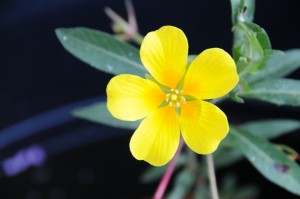Gardeners urged to repel invaders as weather warms up
 Gardeners buying plants as spring warms up are being urged to choose water plants which won’t get out of hand in gardens and invade local wetlands.
Gardeners buying plants as spring warms up are being urged to choose water plants which won’t get out of hand in gardens and invade local wetlands.
Garden pond species like Water Primrose evolved in tropical climates. In the UK it can form huge dense mats which outcompete smaller British plants.
Water Primrose would cost Britain an estimated £242 million to eradicate if it becomes widespread. It spreads easily with new mats forming from even the smallest fragment.
Water Primrose is one of five invasive species which will be banned from sale from April 2014 and gardeners are being asked to help with its phase-out by avoiding any plant for sale which might be Water Primrose.
WWT Head of Conservation Policy Carrie Hume said:
“Garden centres offer many great alternatives to exotic species like Water Primrose which can aggressively take over your pond and local wetlands and rivers. British varieties like Marsh-marigold or Yellow Iris (Water Flag) are just as beautiful and will help to attract native wildlife. Your local pond retailer will be able to advise you on what’s best for your pond.”
Plantlife Head of Conservation Nicola Hutchinson said:
"A legal ban on the sale of five of the most problematic water plants was announced earlier this year but unfortunately doesn't come into force until Spring 2014. Plantlife urges all gardeners to do the responsible thing and avoid buying those species if seen on sale."
The five non-native invasive plants which will be banned from sale in England and Wales in April 2014 are:
- water primrose Ludwigia grandiflora, Ludwigia peploides and Ludwigia uruguayensis
- parrot’s feather Myriophyllum aquaticum,
- water fern Azolla filiculoides,
- floating pennywort Hydrocotyle ranunculoides,
- New Zealand pygmy weed Crassula helmsii.
